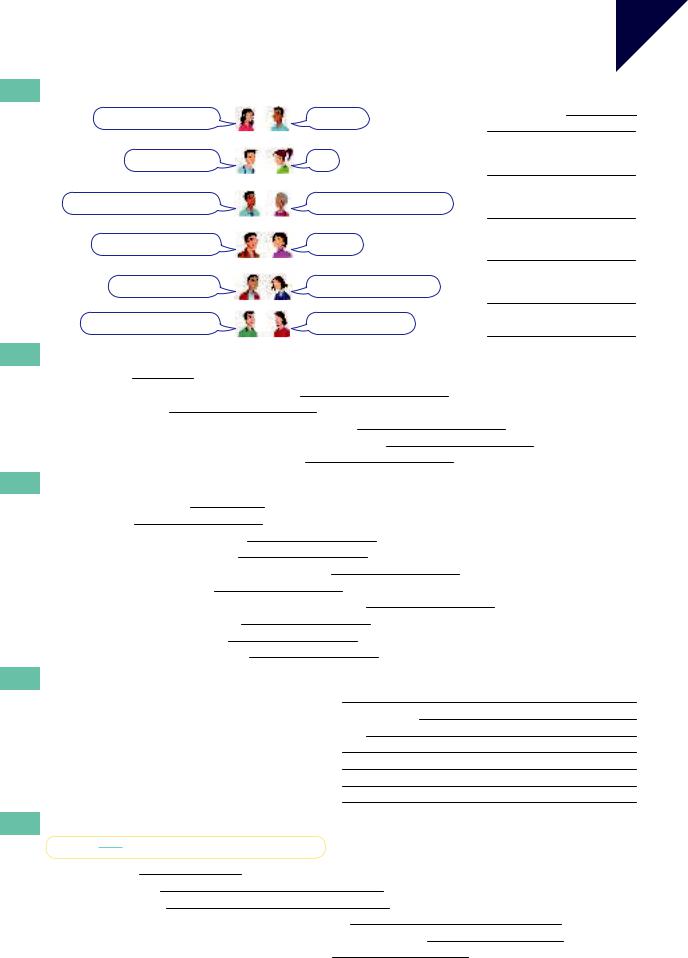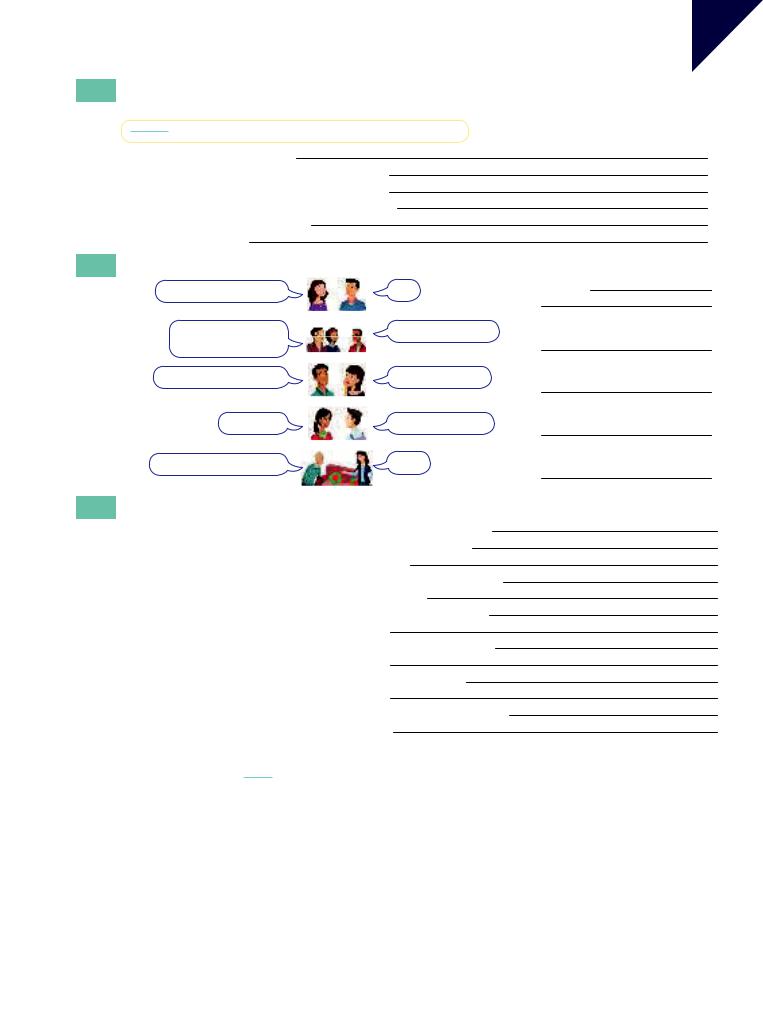
- •Contents
- •Thanks
- •To the student
- •To the teacher
- •3 Present continuous and present simple 1 (I am doing and I do)
- •10 Present perfect continuous and simple (I have been doing and I have done)
- •11 how long have you (been) … ?
- •12 for and since when … ? and how long … ?
- •13 Present perfect and past 1 (I have done and I did)
- •14 Present perfect and past 2 (I have done and I did)
- •15 Past perfect (I had done)
- •16 Past perfect continuous (I had been doing)
- •17 have and have got
- •18 used to (do)
- •19 Present tenses (I am doing / I do) for the future
- •20 I’m going to (do)
- •21 will and shall 1
- •22 will and shall 2
- •23 I will and I’m going to
- •24 will be doing and will have done
- •26 can, could and (be) able to
- •27 could (do) and could have (done)
- •28 must and can’t
- •29 may and might 1
- •30 may and might 2
- •31 have to and must
- •32 must mustn’t needn’t
- •33 should 1
- •34 should 2
- •35 I’d better … it’s time …
- •36 would
- •39 if I knew … I wish I knew …
- •40 if I had known … I wish I had known …
- •41 wish
- •42 Passive 1 (is done / was done)
- •43 Passive 2 (be done / been done / being done)
- •44 Passive 3
- •45 it is said that … he is said to … he is supposed to …
- •46 have something done
- •47 Reported speech 1 (he said that …)
- •48 Reported speech 2
- •49 Questions 1
- •52 Question tags (do you? isn’t it? etc.)
- •53 Verb + -ing (enjoy doing / stop doing etc.)
- •54 Verb + to … (decide to … / forget to … etc.)
- •55 Verb (+ object) + to … (I want you to …)
- •56 Verb + -ing or to … 1 (remember, regret etc.)
- •57 Verb + -ing or to … 2 (try, need, help)
- •58 Verb + -ing or to … 3 (like / would like etc.)
- •59 prefer and would rather
- •60 Preposition (in/for/about etc.) + -ing
- •61 be/get used to … (I’m used to …)
- •63 there’s no point in -ing, it’s worth -ing etc.
- •64 to … , for … and so that …
- •65 Adjective + to …
- •66 to … (afraid to do) and preposition + -ing (afraid of -ing)
- •67 see somebody do and see somebody doing
- •68 -ing clauses (He hurt his knee playing football.)
- •69 Countable and uncountable 1
- •70 Countable and uncountable 2
- •71 Countable nouns with a/an and some
- •74 the 2 (school / the school etc.)
- •75 the 3 (children / the children)
- •77 Names with and without the 1
- •78 Names with and without the 2
- •79 Singular and plural
- •80 Noun + noun (a bus driver / a headache)
- •81 -’s (your sister’s name) and of … (the name of the book)
- •82 myself/yourself/themselves etc.
- •83 a friend of mine my own house on my own / by myself
- •84 there … and it …
- •85 some and any
- •87 much, many, little, few, a lot, plenty
- •90 all every whole
- •91 each and every
- •92 Relative clauses 1: clauses with who/that/which
- •94 Relative clauses 3: whose/whom/where
- •95 Relative clauses 4: extra information clauses (1)
- •96 Relative clauses 5: extra information clauses (2)
- •97 -ing and -ed clauses (the woman talking to Tom, the boy injured in the accident)
- •98 Adjectives ending in -ing and -ed (boring/bored etc.)
- •99 Adjectives: a nice new house, you look tired
- •100 Adjectives and adverbs 1 (quick/quickly)
- •102 so and such
- •104 quite, pretty, rather and fairly
- •105 Comparative 1 (cheaper, more expensive etc.)
- •106 Comparative 2 (much better / any better etc.)
- •107 Comparative 3 (as … as / than)
- •108 Superlative (the longest / the most enjoyable etc.)
- •109 Word order 1: verb + object; place and time
- •110 Word order 2: adverbs with the verb
- •111 still any more yet already
- •112 even
- •114 in case
- •116 as (as I walked … / as I was … etc.)
- •117 like and as
- •119 during for while
- •121 at/on/in (time)
- •122 on time and in time at the end and in the end
- •123 in/at/on (position) 1
- •124 in/at/on (position) 2
- •125 in/at/on (position) 3
- •126 to, at, in and into
- •127 in/on/at (other uses)
- •129 Noun + preposition (reason for, cause of etc.)
- •130 Adjective + preposition 1
- •131 Adjective + preposition 2
- •132 Verb + preposition 1 to and at
- •134 Verb + preposition 3 about and of
- •135 Verb + preposition 4 of/for/from/on
- •136 Verb + preposition 5 in/into/with/to/on
- •137 Phrasal verbs 1 Introduction
- •138 Phrasal verbs 2 in/out
- •139 Phrasal verbs 3 out
- •142 Phrasal verbs 6 up/down
- •143 Phrasal verbs 7 up (1)
- •144 Phrasal verbs 8 up (2)
- •145 Phrasal verbs 9 away/back
- •Additional exercises
- •Study guide
- •Key to Exercises
- •Key to Additional exercises (see page 302)
- •Key to Study guide
- •Index

Unit
54 Verb + to … (decide to … / forget to … etc.)
AAter these verbs you can use to … (infinitive):
ofer |
plan |
manage |
deserve |
|
|
agree |
arrange |
fail |
aford |
|
|
refuse |
hope |
promise |
learn |
|
|
decide |
forget |
threaten |
tend |
|
|
|
|
|
|
||
It was a long way to walk, so we decided to take a taxi home. |
|
||||
Simon was in a dif icult situation, so I agreed to help him. |
|
||||
I waved to Karen, but failed to attract her attention. |
|
||||
I like Dan, but I think he tends to talk too much. |
Dan tends to talk too much. |
||||
How old were you when you learnt to drive? |
|
||||
or |
… learnt how to drive? |
|
|
|
|
The negative is not to … :
We decided not to go out because of the weather.
I promised not to be late.
Ater some verbs, we use -ing (not to …). For example, enjoy/think/suggest:
I enjoy reading. (not enjoy to read)
Andy suggested meeting for cof ee. (not suggested to meet)
Are you thinking of buying a car? (not thinking to buy)
For verb + -ing, see Units 53 and 62.
BAter dare you can use the infinitive with or without to:
I didn’t dare to tell him. or I didn’t dare tell him.
But ater dare not (or daren’t), we do not use to:
I daren’t tell him what happened. (not I daren’t to tell him)
CWe also use to … ater seem, appear, pretend and claim. For example:
They seem to have plenty of money.
Ann pretended not to see me when she passed me in the street.
You can also use to be -ing (continuous infinitive) and to have (done) (perfect infinitive):
I pretended to be reading the newspaper. (= I pretended that I was reading)
Have you seen my keys? I seem to have lost them. (= it seems that I have lost them) She claimed not to have seen me. (= she claimed that she hadn’t seen me)
DAter these verbs you can use a question word (what/how etc.) + to … .
ask know decide remember forget learn explain understand wonder
For example:
We asked |
how |
to get |
to the station. |
Have you decided |
where |
to go |
on holiday? |
I don’t know |
whether |
to apply |
for the job or not. |
Do you understand |
what |
to do? |
|
|
|
|
|
also
show/tell/ask/advise/teach somebody what/how/where to do something:
Can somebody show me how to use this camera? Ask Jack. He’ll tell you what to do.
|
Verb + -ing Unit 53 Verb + object + to … (want etc.) Unit 55 |
108 |
Verb + to … and -ing Units 55C, 56–58 |

Exercises |
Unit |
54 |
|
|
|
54.1 Complete the sentences for these situations.
1 |
Shall we get married? |
Yes, let’s. |
|
||
2 |
Please help me. |
OK. |
|
||
3 |
Can I carry your bag for you? |
No, thanks. I can manage. |
|
||
4 |
Let’s meet at 8 o’clock. |
OK, fine. |
|
||
5 |
What’s your name? |
I’m not going to tell you. |
6 |
Please don’t tell anyone. |
I won’t. I promise. |
|
They decided to get married
She agreed 
He of ered 
They arranged 
She refused 
She promised 
54.2 Complete the sentences. Use a suitable verb.
1 |
Don’t forget to lock |
the door when you go out. |
|
2 |
There was a lot of traf ic, but we managed |
to the airport in time. |
|
3 |
We couldn’t af ord |
in London. It’s too expensive. |
|
4 |
I can’t play a musical instrument, but I’d like to learn |
the guitar. |
|
5 |
I don’t want Mark to know what happened. I decided not |
him. |
|
6 |
We were all afraid to speak. Nobody dared |
anything. |
|
54.3 Put the verb into the correct form, to … or -ing. (See Unit 53 for verbs + -ing.)
1 |
When I’m tired, I enjoy watching |
TV. It’s relaxing. (watch) |
|
2 |
I’ve decided |
for another job. I need a change. (look) |
|
3 |
I’m not going anywhere! I refuse |
|
. (move) |
4 |
I’m not in a hurry. I don’t mind |
|
. (wait) |
5 |
Tina ran in a marathon last week, but she failed |
. (finish) |
|
6 |
I wish that dog would stop |
. It’s driving me crazy. (bark) |
|
7 |
They didn’t know I was listening to them. I pretended |
asleep. (be) |
|
8 |
We were hungry, so I suggested |
|
dinner early. (have) |
9 |
Hurry up! I don’t want to risk |
|
the train. (miss) |
10 |
David is very quiet. He tends not |
|
much. (say) |
54.4 Make a new sentence using the verb in brackets.
.
.
.
.
.
.
1 |
I’ve lost my keys. |
(seem) |
I seem to have lost my keys. |
2 |
Tom is worried about something. |
(appear) |
Tom appears |
3 |
You know a lot of people. |
(seem) |
You |
4 |
My English is getting better. |
(seem) |
|
5 |
That car has broken down. |
(appear) |
|
6 |
Rachel is enjoying her job. |
(seem) |
|
7 |
They have solved the problem. |
(claim) |
|
54.5 Complete each sentence using what/how/where/whether + these verbs:
|
do |
get |
go |
put |
ride |
use |
|
|
1 |
Do you know |
how to get to |
the airport from here? |
|
|
|||
2 |
Would you know |
|
|
|
if there was a fire in the building? |
|||
3 |
You’ll never forget |
|
|
|
a bike once you’ve learnt. |
|||
4 |
I’ve been invited to the party, but I haven’t decided |
|
or not. |
|||||
5 |
My room is very untidy. I’ve got so many things and I don’t know |
them. |
||||||
6 |
I have some clothes to wash. Can you show me |
|
the washing machine? |
|||||
Additional exercises 26–28 (pages 317–19) |
109 |

Unit
55 Verb (+ object) + to … (I want you to …)
A We say:
|
verb |
+ to … |
|
|
verb + |
object |
+ to … |
|||||
|
|
|
|
|
|
|
|
|
|
|
|
|
|
want |
|
|
|
|
|
want |
|
|
|
|
|
|
expect |
|
to go |
|
|
|
expect |
|
|
|
to go |
|
|
ask |
|
to be |
|
and |
|
ask |
|
somebody |
|
to be |
|
|
help |
|
to work |
|
|
help |
|
something |
|
to work |
|
|
|
|
|
|
|
|
|
|
|||||
|
would like |
|
etc. |
|
|
|
would like |
|
|
|
etc. |
|
|
would prefer |
|
|
|
|
|
would prefer |
|
|
|
|
|
|
|
|
|
|
|
|
|
|
|
|||
|
|
|
|
|
|
|
|
|
|
|
|
|
|
We expected to be late. |
|
|
We expected Dan to be late. |
||||||||
|
Would you like to go now? |
Would you like me to go now? |
||||||||||
|
He doesn’t want to know. |
|
|
He doesn’t want anybody to know. |
||||||||
We do not usually say ‘want that’: |
|
|
|
|
|
|
|
|
||||
|
Do you want me to come with you? (not want that I come) |
|
|
|
||||||||
You can use help with or without to. You can say: |
|
|
|
|
||||||||
|
Can you help me to move this table? |
or Can you help me move this table? |
||||||||||
BThese verbs have the structure verb + object + to … :
verb |
+ object |
+ to … |
|
|
|
|
|
|
|
tell |
|
|
|
|
advise |
|
|
|
It’s not a nice hotel. I wouldn’t advise you to stay |
remind |
|
|
|
there. |
warn |
|
|
|
Can you remind me to call Sam tomorrow? |
invite |
|
|
to do |
Joe said the switch was dangerous and warned me |
encourage |
somebody |
|
to be |
not to touch it. |
persuade |
|
|
to work |
I didn’t move the piano by myself. I got somebody |
get |
|
|
etc. |
to help me. |
force |
|
|
|
Who taught you to drive? |
teach |
|
|
|
They don’t allow people to park in front of the |
allow |
|
|
|
building. |
enable |
|
|
|
|
|
|
|
|
|
In these examples, the verb is passive (I was warned / we are allowed etc.):
I was warned not to touch the switch.
Are we allowed to park here?
We do not use suggest with to … :
Jane suggested that I ask you for advice. (not Jane suggested me to ask)
CWe say ‘make somebody do something’, ‘let somebody do something’ (without to):
I made him promise that he wouldn’t tell anybody what happened. (not made him to promise)
Hot weather makes me feel tired. (= causes me to feel tired)
Her parents wouldn’t let her go out alone. (= wouldn’t allow her to go out) Let me carry your bag for you.
We say ‘make somebody do’, but in the passive we say ‘(be) made to do’ (with to):
We were made to wait for two hours. (= They made us wait …)
|
suggest Units 34, 53 tell/ask somebody to … Unit 48D |
Verb + -ing Unit 53 |
110 |
Verb + to … Unit 54 Verb + to … and -ing Units 56–58 |
help Unit 57C |

Exercises |
Unit |
55 |
|
|
|
55.1Complete the questions. Use do you want me to … ? or would you like me to … ? with these verbs (and any other necessary words):
come |
lend |
repeat |
show |
shut |
wait |
1 Do you want to go alone, or |
do you want me to come with you |
||||
2 Do you have enough money, or do you want 3 Shall I leave the window open, or would you 4 Do you know how to use the printer, or would 5 Did you hear what I said, or do
6 Can I go now, or do
55.2Complete the sentences for these situations.
1Meet me at the station.
2Why don’t you come and stay with us?
3Don’t forget to call Joe.
4
Be careful.
5Can you give me a hand?
OK.
That would be nice.
No, I won’t forget.
Don’t worry. I will.
Sure.
She told him to meet her at the station
They invited him 
He reminded her 
She warned 
He asked 
55.3 Complete the second sentence so that the meaning is similar to the first sentence.
1 |
My father said I could use his car. |
My father allowed me to use his car. |
|||
2 |
I was surprised that it rained. |
I didn’t expect |
|||
3 |
Don’t stop him doing what he wants. |
Let |
|||
4 |
Tom looks older when he wears glasses. |
Tom’s glasses make |
|||
5 |
I think you should know the truth. |
I want |
|||
6 |
At first I didn’t want to apply for the |
Sarah persuaded |
|||
|
|
job, but Sarah persuaded me. |
|
||
7 |
My lawyer said I shouldn’t say |
My lawyer advised |
|||
|
|
anything to the police. |
|
||
8 |
I was told that I shouldn’t believe |
I was warned |
|||
|
|
everything he says. |
|
||
9 |
If you’ve got a car, you are able to get |
Having a car enables |
|||
|
|
around more easily. |
|
||
|
|
|
|
||
55.4 |
Which is right? |
|
|||
1 |
You aren’t allowed |
take |
/ to take pictures here. (to take is correct) |
||
2 |
I’m in a dif icult position. What do you advise me do / to do? |
||||
3 |
The film was very sad. It made me cry / to cry. |
||||
4 |
Lisa’s parents always encouraged her study / to study hard at school. |
||||
5 |
Please don’t interrupt me. Let me finish / to finish. |
||||
6 |
You can’t make people do / to do things they don’t want to do. |
||||
7 |
You can’t force people do / to do things they don’t want to do. |
||||
8 |
Sarah won’t let me drive / to drive her car. She doesn’t trust me. |
||||
9 |
Why did you change your decision? What made you change / to change your mind? |
||||
10 |
If you enter a country with a tourist visa, you are not allowed work / to work there. |
||||
?
?
?
?
?
?
.
.
.
.
.
Additional exercises 26–28 (pages 317–19) |
111 |
